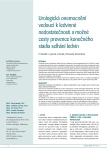UROLOGICAL ASSESSMENT AND PATIENT FOLLOW-UP BEFORE KIDNEY TRANSPLANTATION
Authors:
P. Navrátil; J. Pacovsky; M. Broďák; M. Romžová
Authors‘ workplace:
Urologická klinika, FN a LF UK v Hradci Králové
Published in:
Urol List 2009; 7(1): 21-26
Overview
Outstanding improvement in patients surviving with organ transplant was marked in last decade, in our case with kidney transplant. Let us try to summarize the all factors participating on this fact. Improvement of the immunosuppressive therapy, better surgical technique, better screening before transplantation, high quality of a postoperative care as well as correct and effective preparation before transplantation even before the necessity to start spare therapy using haemodialysis (HD) or continual ambulatory peritoneal dialysis (CAPD). The kidney transplantation (KT) is a surgical method combining techniques of vascular and urologic surgery. Urinary tract has important impact on transplant function. That is why detection of any urologic disease is mandatory. If the urologic disease is found, its correction or treatment is necessary as soon as possible.
KEY WORDS:
urological diseases, urological evaluation, transplantation, end stage of renal disease
Sources
1. Kessler M, Büchler M, Furane D at al. When to place the patient on the kidney transplantation waiting list. Nefrol Ther 2008; 4: 155–159.
2. Siddgi N, Hariharan S, Danovitch GM. Evaluation and Preparation of Renal Transplant Candidates. In: Danovitch GM. Handbook of kidney transplantation. 4. ed. Philadelphia: Lipincott Wiliams & Wilkins 2005: 169–193.
3. Lich R jr, Howerton LW, Davis LA. Reccurent urosepsis in children. J Urol 1961; 86: 554.
4. Pelle G, Vikomt S, Levy PP et al. Acute pyelonephritis represents a risk factor impairing long term kidney graft function. Am J Transplant 2007; 7: 899–907.
5. Lyerova L, Lacha J, Adamec M et al. The urinary tract in graft recipient and urologic complication after kidney transplantation. Rozhledy v Chirurgii 2001; 80: 356–360.
6. Jefferson RH, Burns JR. Urological evaluation of adult renal transplant recipients. J Urol 1995; 153: 615–618.
7. Navrátil P. Praktická urologie u nemocných v dialyzační léčbě, před a po transplantaci ledviny. Hradec Králové: Olga Čermáková 2005: 17.
8. Fuller TF, Liefeldt L, Dragun D et al. Urological evaluation and follow-up of the kidney transplant patient. Urologe A 2006; 45: 53–59.
9. Bayat S, Drámat L, Thilly N et al. Medical and non-medical determination of access to renal transplant waiting list in a French community – based network of case. Nefrol Dial Transplantation 2006; 21: 2900–2907.
10. Scandling JD. Kidney transplant candidate evaluation. Semin Dial 2005; 18: 487–494.
11. Zivcic-Kosic S, Fucak M, Orlic P et al. Evaluation and selection of candidates for renal transplantation at the Clinical Hospital Center in Rijeka. Acta Medica Croatica 2003; 57: 65–68.
Labels
Paediatric urologist UrologyArticle was published in
Urological Journal

2009 Issue 1
Most read in this issue
- UROLOGICAL COMPLICATIONS AFTER KIDNEY TRANSPLANTATION
- SURGICAL TECHNIQUES IN KIDNEY TRANSPLANTATION
- UROLOGICAL DISEASES CONTRIBUTING TO RENAL INSUFFICIENCY AND POSSIBLE WAYS OF END STAGE RENAL DISEASE PREVENTION
- THREE KINDS OF RESOURCES FOR KIDNEY TRANSPLANTATION
